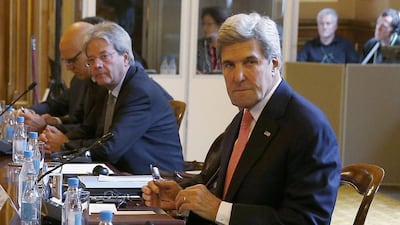Paris // A “supreme expenditure council” will take control of Libya’s ailing economy as fears grow that the country is facing financial ruin.
The council, to be run by key political and administrative leaders, was the result of a two-day conference that ended on Tuesday at Britain’s foreign office.
Civil war, political chaos and militia violence have all helped precipitate a crumbling economy, to the point where the World Bank warned in October that the country now faced “collapse.”
The meeting was led by US secretary of state John Kerry, British foreign secretary Boris Johnson and key powers supporting Libyan peace efforts, including the UAE.
Diplomats said the council would take a firm grip on expenditure, foreign reserves and oil exports, the latter having fallen to less than half their level of 1.4 million barrels a day before the start of civil war in July 2014.
Sheikh Abdullah bin Zayed, Minister of Foreign Affairs and International Cooperation, participated in the first day of talks on Monday alongside Mr Kerry and Mr Johnson, and all three called for unity among Libya’s disparate factions.
Participants from the Libyan side include Fayez Al Serraj, prime minister of the UN-recognised Government of National Accord (GNA) and head of the Presidential Council of Libya, other key ministers and Saddick Al Kabir, governor of the central bank and Mustafa Sanallah, head of Libya’s National Oil Corporation.
International participants, including representatives from Italy, France and Saudi Arabia, commended the role of the UAE in supporting efforts to reach a peaceful solution in Libya.
The problem for Mr Al Serraj and his ministers is in finding consensus across the country to implement reform after a series of political body blows to his credibility.
On April 23 the elected House of Representatives parliament, sitting in the eastern town of Tobruk, voted against a cabinet proposed by Mr Al Serraj, the second time it has rejected his ministerial choices, leaving him without a functioning government.
Under the Libya Political Agreement, which governs how Libya is to be run, Mr Al Serraj depends on the parliament to act as the country’s legislature.
For the moment the House of Representatives operates its own parallel government, under prime minister Abdulah Al Thinni which refuses to acknowledge the administration of Mr Al Serraj.
A further blow to Mr Al Serraj’s authority came on September 12 when field marshal Khalifa Haftar, commander of Tobruk parliament forces, captured the four key central oil ports from a militia, the Petroleum Facilities Guard, which is loyal to Mr Al Serraj.
This capture has left him with no direct control over the bulk of the country’s oil exports. He will need Tobruk to agree to any reform measures to the oil sector, as the parliament now controls both the ports and the giant Sirte Basin oilfields.
A third blow came on October 11 with the World Bank issuing a hard hitting report warning that Libya faces economic disaster. The report said foreign reserves have fallen from US$100 billion (Dh367bn) at the start of the year to a projected $43bn at the end of 2016.
“The Libyan economy is near collapse as political stalemate and civil conflict prevent it from fully exploiting its sole natural resource: oil’’, said the report.
Then later in October, Mr Al Sarraj accused Mr Al Kabir, the central bank governor, of mismanaging state finances and failing to support the dinar, which is now trading at 5:1 against the dollar on the Tripoli black market, three times the official bank exchange rate. Mr Al Kabir hit back, saying Mr Al Serraj’s administration had failed to produce a cohesive economic plan.
Optimists at the conference say this plan is in place, with Italian foreign minister Paolo Gentiloni saying there was “a glimmer of hope in finding a compromise.”
There was more optimism from Martin Kobler, head of the United Nations Support Mission for Libya. Present in London, he tweeted on Tuesday that the opening discussions had been successful. “Money must reach the people of Libya for a better life, now!” he said.
Many Libyans hope he is right, as Mr Al Serraj’s government struggles to find the illusive unity that is a precondition to economic success.
foreign.desk@thenational.ae

